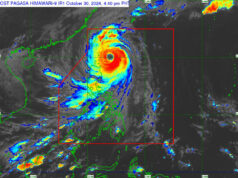THE electronic cigarette lobby said its products need to be fairly taxed and regulated, especially if the Philippines hopes to fund its Universal Health Care system in part with the proceeds of a tax on e-cigarettes.
Tikki Pang, who was conducting a briefing on behalf of e-cigarette manufacturer Juul Labs Inc., added that the industry’s products offer an opportunity for smokers to wean themselves from traditional tobacco products, effectively improving health outcomes.
“Universal Health Care is about prevention, about reducing the harm not about discouraging a product. That will burden your healthcare system,” he said.
“To deny smokers of a product that can improve their health, to me, is a human rights violation.”
Legislators are considering higher excise taxes on products categorized as Electronic Nicotine Delivery Systems and Electronic Non-Nicotine Delivery Systems (ENDS/ENNDS) to help fund the UHC law. Under the Comprehensive Tax Reform Program (CTRP) Package 2+, the excise tax on ENDS/ENNDS products will be at par with traditional tobacco products.
The Department of Health (DoH) contests the claim that e-cigarettes and vapes are not proven to be safe alternatives to tobacco products. It issued Administrative Order 2019-0007 in June calling for the licensing of ENDS/ENNDS sellers, distributors, and manufacturers. The AO also called for the prohibition of product sales to people under 18 years.
Mr. Pang agreed with these regulations on reducing general access and added that Juul has recently adopted a policy ruling out the sale of its products for potential buyers who cannot prove they are older than 18
Mr. Pang, a former WHO Technical Advisory Group member, argued that heavy taxation and regulation would increase the risks for the 17 million Filipino smokers, many of whom are low-income.
Mr. Pang, a public policy expert whose affiliations include the National University of Singapore, according to an Internet search,backed the regulation of the industry’s products as consumer goods, and not as medical devices.
Medical-device status, he said, means smokers “have to go to a physician to get a prescription and interestingly, that will stigmatize this… It should be available as a consumer product just like cigarettes but with certain safeguards.”
He cited a New England Journal of Medicine (NEJM) study published in February, researchers from the UK found that users of e-cigarettes have a higher success rate in quitting smoking compared with users of nicotine-replacement products such as gum and nose sprays.
He also backed a quality control regime for device makers.
The DoH will be releasing joint guidelines soon with the Department of Trade and Industry (DTI) regarding device standards, after reports of users injured by exploding devices.
He opposed level taxation with traditional tobacco products, which he said would restrict access by low-income smokers.
“The people who stand to benefit the most are usually from the lower-income groups so if you increase the tax, these products will be less affordable for them. The whole idea is to use these products to help them quit smoking… What will they do if they cannot afford it? They will just continue smoking, “ he said.
“(ENDS/ENNDS) are 95% less harmful so why tax it the same rate as something more harmful?”
Later this year, the DoH will issue guidelines regulating ENDS/ENNDS packaging, e-liquid flavors, the licensing of businesses, and the registration of ENDS/ENNDS products. It intends to prohibit flavors that will appeal to the young people.
Juul has said in its position paper on the proposed higher excise taxes on ENDS/ENNDS products that flavored products “play a critical role in (keeping) adult smokers away from combustible cigarettes” but added that it supports a ban on flavored e-liquids that resemble dessert foods, cannabis, soft drinks, and energy drinks. Juul sells only four flavors in the Philippines: mint, tobacco, mango, and creme. — Gillian M. Cortez



